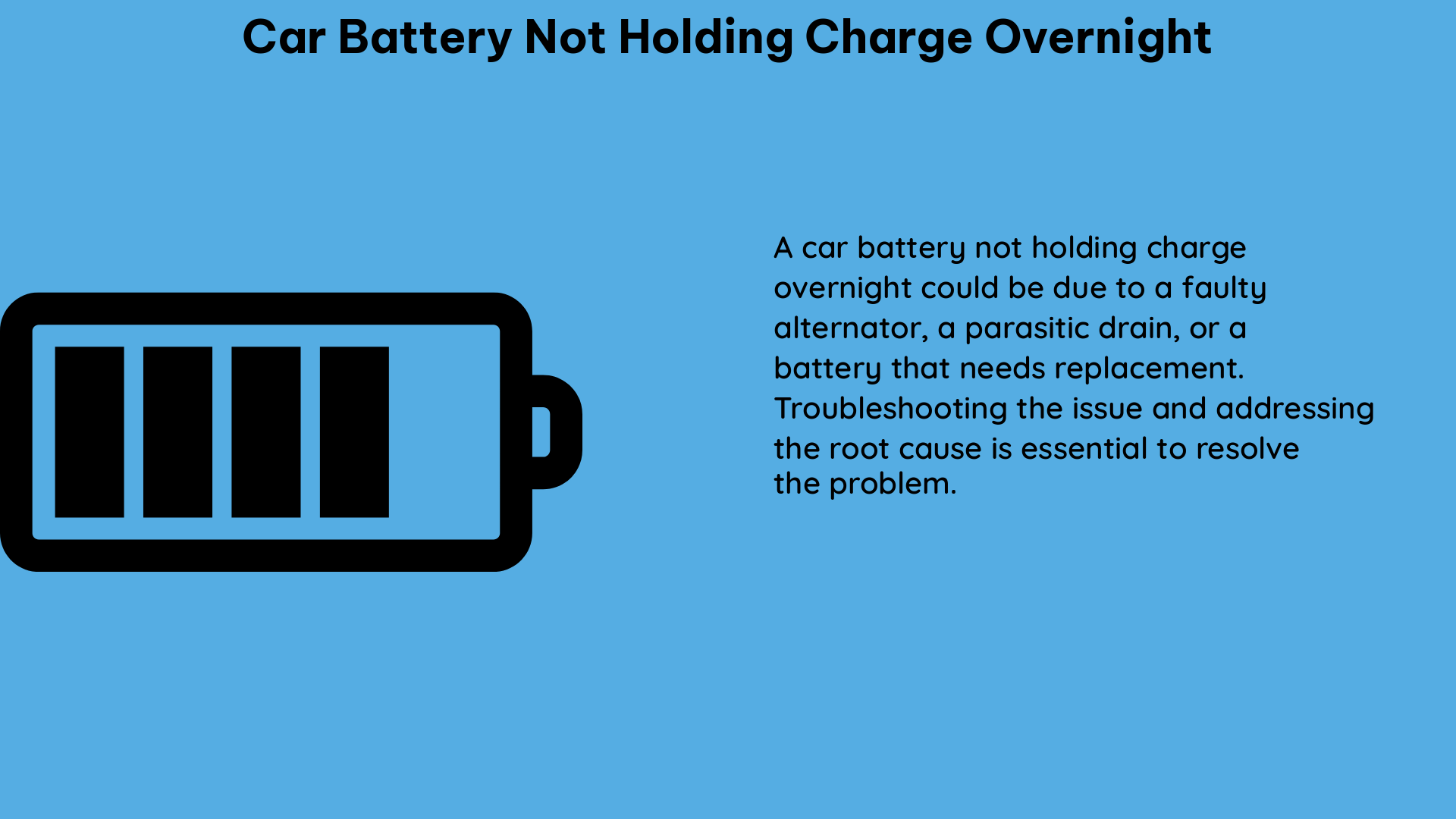A car battery not holding charge overnight can be a frustrating issue, but with the right knowledge and tools, it can be easily diagnosed and addressed. This comprehensive guide will delve into the common causes of this problem, provide detailed technical specifications, and offer step-by-step solutions to help you get your car back on the road.
Causes of Car Battery Not Holding Charge Overnight
1. Sulfation
Sulfation is a common issue in lead-acid batteries, which occurs when the battery is deprived of a full charge. This condition can be reversed if caught early, but if left untreated for an extended period, it can lead to permanent sulfation, making the battery irrecoverable.
Technical Specifications:
– Reversible sulfation can often be corrected by applying an overcharge to an already fully charged battery in the form of a regulated current of about 200mA for 24 hours, increasing the battery temperature to 50–60°C (122–140°F) during the corrective service.
– A fully charged battery should retain a stable voltage profile on discharge to indicate a better chance of reactivation.
2. Parasitic Battery Drain
Parasitic battery drain occurs when an electrical component in the vehicle continues to draw power from the battery, even when the vehicle is turned off. Common culprits include interior or exterior lights, alarms, or electronic devices connected to the power outlets.
Technical Specifications:
– A healthy car battery should have a current draw of less than 50 milliamps when the vehicle is turned off.
– To diagnose a parasitic battery drain, you can use a multimeter to measure the current draw when the vehicle is off. If the current draw is significantly higher than 50 milliamps, it indicates a parasitic drain.
3. Weak Battery
In some cases, a weak battery may be the root cause of the problem. A weak battery may not be able to hold a charge overnight, especially if it is old or has been subjected to deep discharge cycles.
Technical Specifications:
– A healthy car battery should maintain a voltage of at least 12.6V when fully charged.
– To determine if the battery is the issue, you can perform a load test using a battery load tester or a multimeter. If the voltage drops significantly under load, it indicates a weak battery.
Addressing the Issues

Reversing Sulfation
To address reversible sulfation, you can try the following steps:
1. Fully charge the battery using a regulated charger.
2. Apply an overcharge to the fully charged battery in the form of a regulated current of about 200mA for 24 hours.
3. Increase the battery temperature to 50–60°C (122–140°F) during the corrective service.
4. Monitor the battery’s voltage profile during discharge to ensure it retains a stable voltage, indicating a successful reactivation.
Diagnosing and Addressing Parasitic Drain
To diagnose and address a parasitic battery drain, follow these steps:
1. Use a multimeter to measure the current draw when the vehicle is turned off. If the current draw is significantly higher than 50 milliamps, it indicates a parasitic drain.
2. Perform a systematic fuse-pull test by disconnecting each fuse one at a time while monitoring the current draw. This process will help identify the circuit causing the excessive draw.
3. Once the culprit is identified, address the issue by repairing or replacing the faulty component.
Replacing a Weak Battery
If the battery is determined to be the root cause of the problem, it’s time to replace it. Follow these steps:
1. Perform a load test using a battery load tester or a multimeter to confirm the battery’s weakness.
2. Ensure the new battery is of the correct size, type, and capacity for your vehicle.
3. Properly dispose of the old battery in accordance with local regulations.
4. Install the new battery and ensure it is securely connected.
5. Charge the new battery fully before putting it into service.
Preventive Measures
To prevent a car battery from not holding charge overnight, it’s essential to maintain a regular charging schedule, especially for vehicles driven primarily in city environments with frequent stop-and-go traffic. This ensures that the battery receives a full charge, minimizing the risk of sulfation.
Additionally, regularly checking the vehicle for any signs of parasitic drain and addressing any issues promptly can help maintain battery health and longevity.
Conclusion
By understanding the common causes of a car battery not holding charge overnight and following the detailed technical specifications and troubleshooting steps outlined in this guide, you can effectively diagnose and address the issue. Remember to always prioritize safety and consult a professional if you’re unsure about any aspect of the process.
References:
- Mechanics Stack Exchange – Replace or Recharge a Battery After It Has Been Drained
- Car Talk Community – Power Drain Overnight
- Eng-Tips Forum – Battery Drain Overnight
- Battery University – Sulfation and How to Prevent It

The lambdageeks.com Core SME Team is a group of experienced subject matter experts from diverse scientific and technical fields including Physics, Chemistry, Technology,Electronics & Electrical Engineering, Automotive, Mechanical Engineering. Our team collaborates to create high-quality, well-researched articles on a wide range of science and technology topics for the lambdageeks.com website.
All Our Senior SME are having more than 7 Years of experience in the respective fields . They are either Working Industry Professionals or assocaited With different Universities. Refer Our Authors Page to get to know About our Core SMEs.